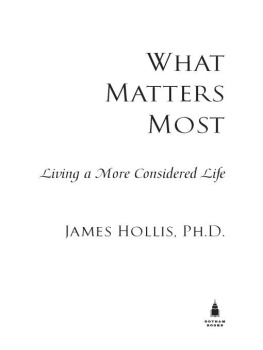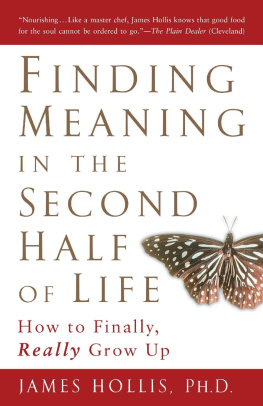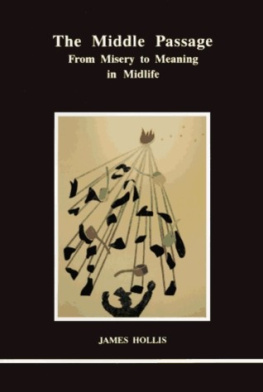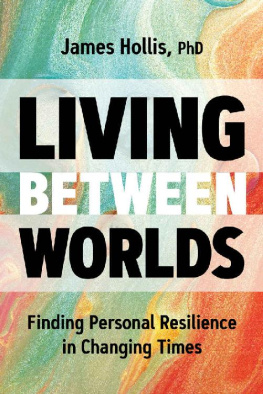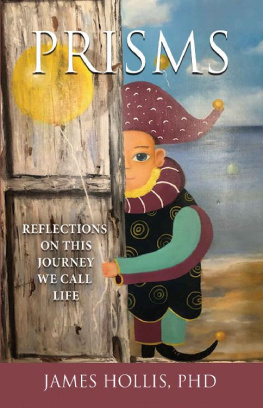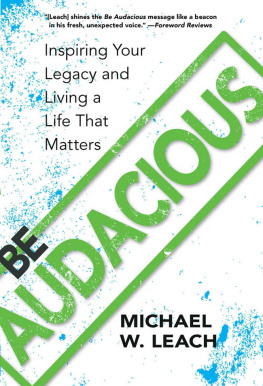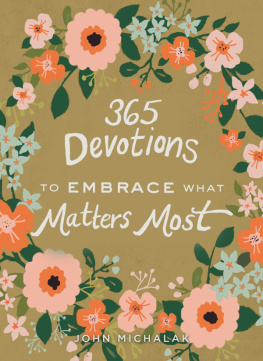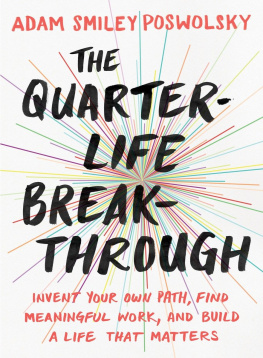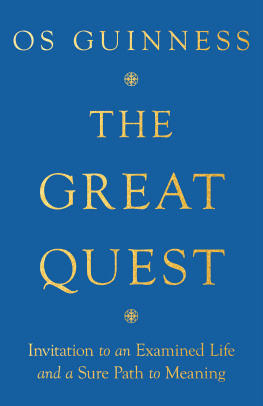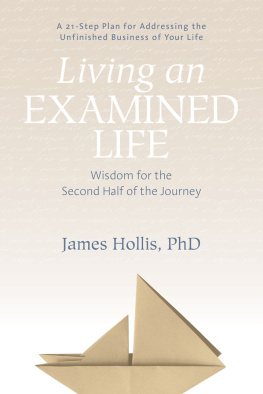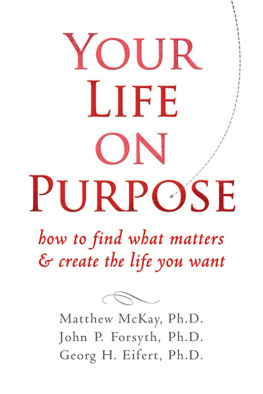Table of Contents
ALSO BY JAMES HOLLIS, PH.D.
Finding Meaning in the Second Half of Life Why Good People Do Bad Things

GOTHAM BOOKS
Published by Penguin Group (USA) Inc.
375 Hudson Street, New York, New York 10014, U.S.A.
Penguin Group (Canada), 90 Eglinton Avenue East, Suite 700, Toronto, Ontario M4P 2Y3,
Canada (a division of Pearson Penguin Canada Inc.) Penguin Books Ltd, 80 Strand,
London WC2R 0R L, England Penguin Ireland, 25 St Stephens Green, Dublin 2, Ireland
(a division of Penguin Books Ltd) Penguin Group (Australia), 250 Camberwell Road,
Camberwell, Victoria 3124, Australia (a division of Pearson Australia Group Pty Ltd)
Penguin Books India Pvt Ltd, 11 Community Centre, Panchsheel Park, New Delhi - 110
017, India Penguin Group (NZ), 67 Apollo Drive, Rosedale, North Shore 0632, New
Zealand (a division of Pearson New Zealand Ltd) Penguin Books (South Africa) (Pty) Ltd,
24 Sturdee Avenue, Rosebank, Johannesburg 2196, South Africa
Penguin Books Ltd, Registered Offices: 80 Strand, London WC2R 0RL, England
Published by Gotham Books, a member of Penguin Group (USA) Inc.
First printing, January 2009
Copyright 2009 by James Hollis
All rights reserved
Gotham Books and the skyscraper logo are trademarks of Penguin Group (USA) Inc.
LIBRARY OF CONGRESS CATALOGING-IN-PUBLICATION DATA
has been applied for.
eISBN : 978-1-440-65522-7
Without limiting the rights under copyright reserved above, no part of this publication may be reproduced, stored in or introduced into a retrieval system, or transmitted, in any form, or by any means (electronic, mechanical, photocopying, recording, or otherwise), without the prior written permission of both the copyright owner and the above publisher of this book.
The scanning, uploading, and distribution of this book via the Internet or via any other means without the permission of the publisher is illegal and punishable by law. Please purchase only authorized electronic editions, and do not participate in or encourage electronic piracy of copyrighted materials. Your support of the authors rights is appreciated.
While the author has made every effort to provide accurate telephone numbers and Internet addresses at the time of publication, neither the publisher nor the author assumes any responsibility for errors, or for changes that occur after publication. Further, the publisher does not have any control over and does not assume any responsibility for author or third-party Web sites or their content.
http://us.penguingroup.com
Version_2
For Jill,
For Taryn, Jonah, and Seah
And for the people of the Jung Center of Houston, Texas, and Saybrook Graduate School of San Francisco
And with my deep personal thanks to those with whom
I am most privileged to be associated:
Liz Harrison, agent, friend, sine qua non
William Shinker, President and Publisher, Gotham Books
Lauren Marino, Executive Editor, Gotham Books
And most of all for Timothy James Hollis,
(2/69-11/07),
son and friend who made me laugh,
challenged my imagination,
with whom I walked the high country,
and who is with me always....
The sufferings are not explained,
nor all the lessons in love,
nor what beholds us in death
only song, over our land,
blesses and celebrates.
R. M. RILKE, SONNETS TO ORPHEUS, #19
PREFACE: WHAT MATTERS MOST
What Matters Most: Living a More Considered Life is an admittedly eccentric compilation for which I offer neither apology nor justification. It pretends to no completeness, and will undoubtedly stir in the reader many other ideas, notions, prejudices, and predilections that could also have been included. (Such further thoughts, additions, and objections will thereby prove much the richer as readers are summoned to consider what matters most for them.)
I will not rehearse the usual list of what matters most , namely: friends and family, love, honor, good work, reputation, and the like. Matters thus obvious seem to take care of themselves. Of course relationships matter, for without them we would never find the dialectical challenge of the otherness of the other that causes us to grow. But this book asks each of us to consider more thoughtfully the relationship we have to ourselves, for that is what we bring to the table in the sundry scenes of this serial we call our life. With William Blake, I conclude that our highest faculty is not reason, useful and necessary as that is, but the imagination. The problem with our lives is that the stunted vision that our complexes, conditioned attitudes, and adaptive reflexes repeat lacks imagination. That is why our psyche protests and we are summoned to reconsideration by our symptoms.
Most of us would further agree that it matters that we bring no harm, or at least less harm, to others. This noble desire asks that we become progressively aware of, explore, take responsibility for our personal shadow. The shadow includes those parts of ourselves that make us uncomfortable with ourselves, whether it be our capacity for evil; our insurgent, narcissistic agendas; or our most spontaneous, healing, instinctually grounded selves.
There are many other ideas that are worthy of inclusion here in What Matters Most , but, because of space, they need wait another day. Among such a potentially infinite list are the following seven:
1. Life is a series of gains, but it is also a series of losses; failures to grieve loss and disappointment openly, honestly, will rise again, as unbidden ghosts from their untimely burial, through depression, or as projections onto objects of compelling, delusive desire, or through captivation by the mindless distractions of our time. Failure to incorporate loss into our lives means that we have not yet accepted the full package life brings to us. Everything given is also lost, redeemed by us only through a more conscious affirmation of values that we continue to serve.2. The recovery of personal authority is critical to the conduct and reconstruction of the second half of life. If we are little more than our adaptations, then we collude with happenstance, and remain prisoners of fate. No matter how sovereign we believe we are, we remain the lowliest of serfs to the tyrannies of whatever remains unconscious.3. Despite how risky love is, how easily we are hurt, none of us can run from risking the dangerous shoals of love, compassion, and openness to others, lest we live a sterile, unrelated life, locked within the constricted frames of our history and our comfort zones. The paradox of relationship will always be that rather than solve our problems for us, relationship brings us new problems, new complexities, but that we also grow immensely from these problems, these complexities. In short, the greatest gift of relationship proves to be that as the result of encountering each other, we are obliged to grow larger than we had planned.4. All of us feel shamed by life; all of us consider ourselves failures of some kind, screw-ups in some arena important to us. Notice how shame , consciously or unconsciously, pulls us away from risk, ratifies our negative sense of worth through self-sabotage, or compels us into frenetic efforts at overcompensation, grandiosity, or yearning for validation that never comes. How much each of us needs to remember theologian Paul Tillichs definition of grace as accepting the fact that we are accepted, despite the fact that we are unacceptable.5. Staying psychologically balanced so that in the good moments, we also remember the decline and dissolution that rushes toward us like tomorrow, and that in the moments of quiet despair we remember we have a soul, and that our soul is inviolate unless we give it away.6. No matter how well intended we begin, sooner or later we all spend good portions of this journey stumbling through savannas of suffering, wherein we nonetheless find tasks that, when addressedeven in those dismal, diminishing circumstancesenlarge us. Going through suffering, rather than denying or anesthetizing it, knowing that if we hang in there, it will bring us choices that can either enlarge us or diminish us, and that when we are least in control, we still retain the freedom of choosing what matters to us.7. And it matters that we retain a sense of humor . Humor is a way in which we honor the contradictions, acknowledge the discrepancies, suffer the reversals, and release the tension through laughter when, on other occasions, tears are our preferred recourse. Recall Robert Frosts wry couplet Forgive O Lord my little joke on me / And Ill forgive Thy great big joke on me. In my desk I have two cartoons to which I frequently refer to keep things in perspective. One shows an analyst being asked what terms like individuation mean, and he says, I havent the foggiest.... The other one shows a therapist being asked if he had cured anyone that day. Not to my knowledge, he replies.
Next page
